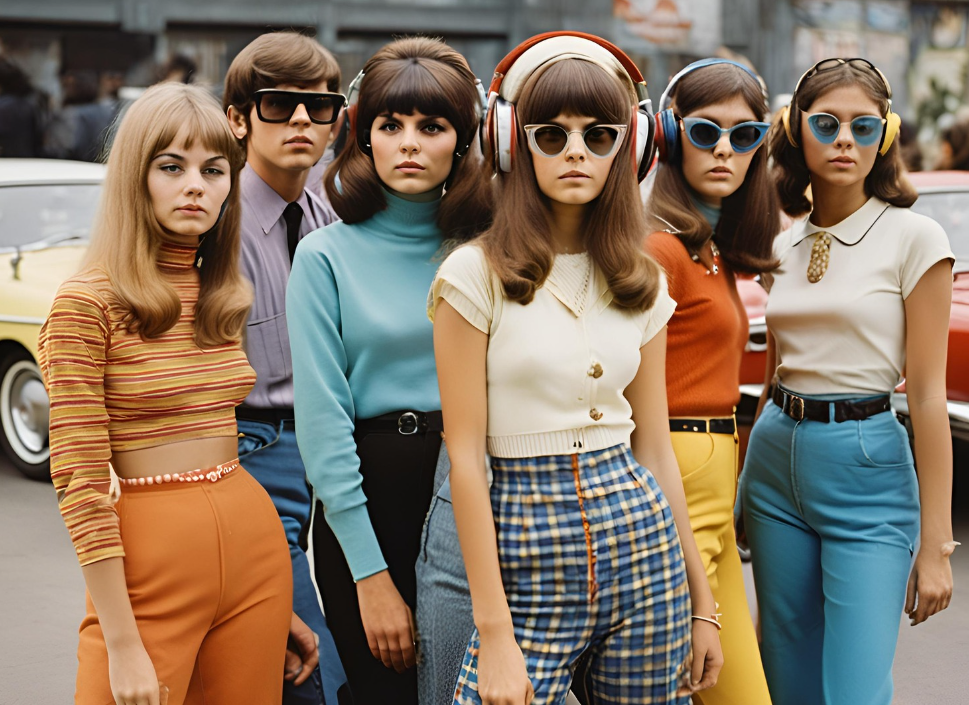The Groovy Sounds of the 70s: A Musical Journey
19 JANUARY, 2024
NOSTALGIE NEW YORK

In an age dominated by digital innovation and rapidly changing musical trends, it might seem counterintuitive that the modern generation is so enamored with music from the 1960s to the 1990s. Yet, this enduring appeal is undeniable, driven by a variety of factors that make classic tunes from these decades resonate deeply with today’s youth. Here’s an exploration of why modern listeners are so captivated by music from the 60s to the 90s.

Music from the 60s to the 90s often captures raw and genuine emotions, offering a depth that many listeners find compelling. Artists from these eras frequently wrote and performed their own material, infusing their music with personal experiences and emotions that are palpable and relatable.
Many songs from these decades address universal themes such as love, heartbreak, rebellion, and social change. These timeless themes resonate across generations, allowing modern listeners to connect with the music on a personal level.
Music from the 60s to the 90s often reflects significant cultural and social movements. The 60s brought the counterculture and civil rights anthems, the 70s saw the rise of disco and punk, the 80s were characterized by new wave and synth-pop, and the 90s were dominated by grunge and hip-hop. These genres not only defined their times but also influenced subsequent cultural and musical developments.
Listening to music from these decades provides younger generations with a sense of historical perspective. It’s a way to learn about the past and understand the cultural and societal changes that have shaped the present.
Streaming platforms like Spotify, Apple Music, and YouTube have made it easier than ever to access music from any era. Curated playlists, algorithmic recommendations, and user-friendly search functions enable younger listeners to discover and explore classic tracks effortlessly.
Social media, particularly platforms like TikTok, has played a significant role in reviving interest in older music. Viral challenges and trends often feature classic songs, reintroducing them to a new audience. For example, Fleetwood Mac’s “Dreams” experienced a resurgence after a viral TikTok video, leading to renewed interest in their music.
Classic songs are frequently used in movie soundtracks, TV shows, and commercials. Popular shows like “Stranger Things” and movies like “Guardians of the Galaxy” prominently feature music from the 60s to the 90s, exposing younger audiences to these timeless tracks and creating new fans.
Many young people are introduced to music from the 60s to the 90s by their parents or older family members. This shared musical experience creates a sense of nostalgia and familial connection, making the music more meaningful and cherished.
There’s a certain nostalgia for the perceived simplicity and sincerity of the past. In a fast-paced, technology-driven world, music from the 60s to the 90s offers a comforting escape to what is often viewed as a more straightforward and authentic era.
Many artists from the 60s to the 90s were highly skilled musicians, and their music showcases impressive instrumentation and complex arrangements. Bands like Led Zeppelin, The Beatles, and Pink Floyd are celebrated for their musical prowess and innovative soundscapes, which continue to captivate listeners.
The songwriting of these decades is often praised for its creativity and originality. Whether it’s the poetic lyrics of Bob Dylan, the experimental compositions of The Beach Boys, or the anthemic quality of Queen’s hits, the music stands out for its inventive and enduring appeal.
The music of the 60s to the 90s has laid the foundation for many modern genres and styles. Contemporary artists frequently cite these decades as major influences on their work. By exploring the music that inspired their favorite modern artists, young listeners gain a deeper appreciation for its historical significance and lasting impact.
Modern musicians often sample or cover classic tracks, introducing them to a new audience. This blending of old and new not only pays homage to the original artists but also keeps their music relevant and accessible.
The modern generation's fascination with music from the 60s to the 90s is a testament to the timeless quality of these decades' tunes. Whether it’s the authenticity and emotional depth, the cultural and historical significance, the influence of media and technology, or the nostalgia and superior musicianship, these factors combine to create a powerful and enduring connection. As technology continues to evolve and make older music more accessible, it’s likely that the songs from these iconic decades will continue to inspire and captivate listeners for generations to come.
Send us your email and we'll reply so you can send us
your questions or suggestions.
Thoma 19 jun 2024
ReplyMalion 19 jun 2024
ReplyThoma 19 jun 2024
Reply